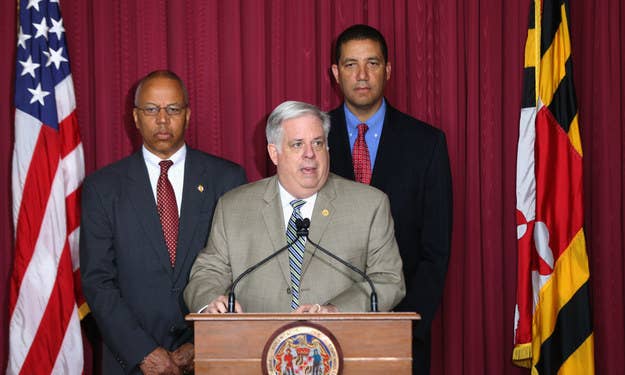
Maryland Governor Larry Hogan vetoed a series of bills on Friday that would have relaxed criminal penalties for marijuana, tightened the state's civil asset forfeiture laws and made it easier for formerly incarcerated people to vote.
The four bills are part of a trend towards more lenient criminal laws and more restrictions on law enforcement that has swept through many states in recent years. Hogan's vetoes came weeks after riots and protests over the death of Freddie Gray, a 25-year-old black man in Baltimore who died in police custody in April. On Thursday, State's Attorney Marilyn Mosby announced that a grand jury had indicted six officer tied to Gray's arrest and transport.
The marijuana bill, which passed the state legislature in April, would have legalized possession of marijuana paraphernalia. Lawmakers intended the bill as a fix to the 2014 bill that decriminalized small amounts of marijuana omitted marijuana paraphernalia, leaving it illegal. As Hogan noted in his letter explaining the veto, this bill "attempts to correct the unintended consequences from last year's law."
But Hogan claimed that if the bill became law, "local law enforcement would be left with no authority to make a traffic stop if they see someone smoking marijuana while driving."
The civil forfeiture bill, which passed the state legislature in March, aimed to make it harder for police to seize property from suspects who turn out to be innocent. The law would have increased the burden of proof for authorities, who would have had to show that a "preponderance of evidence" tied the property to the alleged crime. The current law requires the property owner to prove in court that the assets were not connected to criminal activity in order to get them back.
The proposed bill also would have prevented authorities from seizing more than $300 in most cases. The Baltimore Sun reported that in 48 percent of Maryland forfeiture cases that closed in 2012 the government held onto the property even when a suspect was not convicted of any crime. That year, police across the state received around $6 million worth of property seized in connection federal cases. Funds from seized assets are poured back into a respective department's budget, funding everything from training to investigations to equipment.
Hogan argued the bill "would greatly inhibit local law enforcement agencies from pursuing assess forfeiture from drug dealers." He added that it would also "detrimentally impact law enforcement efforts" against human trafficking and illegal weapons. Instead, Hogan announced that he was forming a commission to review current forfeiture laws.
Two other bills vetoed by Hogan, on from the state house and the other from the state senate, would have restored voting rights to around 40,000 people on probation or parole. As it stands, the state does not allow ex-cons to vote until after they finish their time on post-release supervision. Hogan stated that the law should remain that way because people on supervision "are still serving their debt" to society.
The current law, Hogan added, "achieves the proper balance" between "repayment of obligations to society" and "the restoration of various restricted rights."
In all, Hogan vetoed six bill on Friday. The final two were related to state tax laws.
